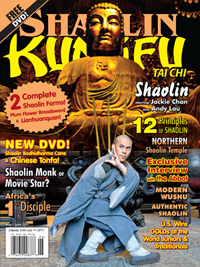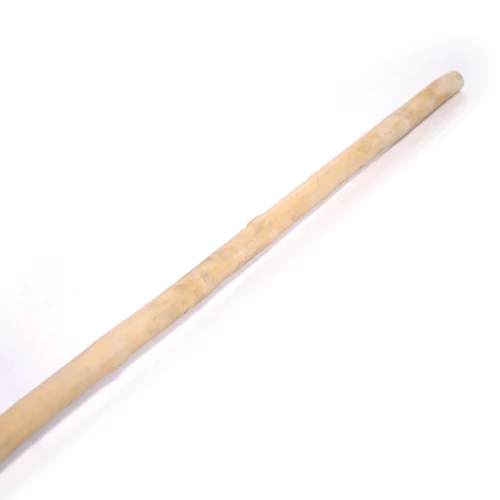By Gene Ching with Gigi Oh
 When I first met Yanneng, Shaolin was a very different place. It was 1995, the 1500th anniversary celebration of the founding of Shaolin Temple and four years before Shi Yongxin (释永信) was inaugurated as abbot. Surrounding Shaolin Temple was a shabby chaotic village filled with dozens of private kung fu schools, ramshackle stores selling weapons, snacks and beer, and garish tourist traps like Mao's personal airplane and a Chinese mummy. Every day, the surrounding fields were teaming with ragamuffin children training in the dirt. With so many schools so close together and few resources, coaches and masters were in constant competition, and that got ugly sometimes.
When I first met Yanneng, Shaolin was a very different place. It was 1995, the 1500th anniversary celebration of the founding of Shaolin Temple and four years before Shi Yongxin (释永信) was inaugurated as abbot. Surrounding Shaolin Temple was a shabby chaotic village filled with dozens of private kung fu schools, ramshackle stores selling weapons, snacks and beer, and garish tourist traps like Mao's personal airplane and a Chinese mummy. Every day, the surrounding fields were teaming with ragamuffin children training in the dirt. With so many schools so close together and few resources, coaches and masters were in constant competition, and that got ugly sometimes.
Standing in the center of the village was the Songshan Shaolin Temple Wushuguan, a government-run facility designed to cater to the martial pilgrims who came from all over the globe in search of authentic Shaolin. However, there weren't many foreigners making the trip in those days. The Wushuguan was designed to accommodate many more students than what showed up. A small contingent of wuseng (武僧warrior monks) were stationed at the Wushuguan as Shaolin emissaries. They taught, promoted international friendship and answered challengers.
Back then, Shi Yanneng (释延能) went by a different Shaolin name, Shi Xingyu (釋行宇). When challengers came knocking, he answered with his gut. Xingyu was a master of iron stomach. He'd let anyone who walked into Shaolin Village take their best shot, sometimes several shots. Hundreds of heavy hitters - martial artists of all styles from all around the world - gave Xingyu their all. I personally witnessed professional fighters throw their biggest bombs into Xingyu's belly. He never even flinched. Xingyu's rock hard abs were built by Shaolin, and built to last.
I saw Xingyu again almost a decade later, but this time on the big screen. He played Coolie in Stephen Chow's (周星馳) groundbreaking action comedy, Kung Fu Hustle. Following that role, Xingyu starred in several of the most talked-about kung fu films including Dragon Tiger Gate, Flashpoint and Ip Man (all starring Donnie Yen (甄子丹)), Sammo Hung's (洪金寶) irreverent Kung Fu Chefs, and the internationally acclaimed Bodyguards and Assassins. Xingyu's characters ranged from villains to heroes, always magnificent fighters and always very intense. "The parts I play don't have too much dialog," admits Xingyu in Mandarin. "It's more about my kung fu."
Xingyu's latest film is Shaolin starring Andy Lau and Jackie Chan. It is the role of a lifetime. Once again, Xingyu shaved his head, donned robes and returned to the temple he loves. "I learned about this movie a year before it started," revealed Yanneng using the name he goes by now. "They already approached me because everyone knew I was from Shaolin and had Shaolin kung fu. The director (Benny Chan陈木胜) asked me to leave my schedule open to join this movie." Shaolin is the first film ever to receive an official blessing from Venerable Abbot Shi Yongxin.
"I'm one of the people who really witnessed all of Shaolin's recent changes," adds Yanneng. "My position was different than the wuseng in the Wushuguan because I was one of less than fifty monks who were from inside Shaolin Temple. There weren't many people learning Shaolin inside the temple. Most of the time, the masters were hiding up in the mountains to train privately. My routine life was about taking care of the old monks. I spent a lot of time visiting the mountain caves to learn from the hermit monks. It was very different than what was happening in the Wushuguan. It's also very different than what most people think happens at Shaolin. I used to have to get up at 4 AM to chop wood and carry water from the well. I had to plant vegetables, train and learn Chan (Zen) Buddhism. For many years, it was like that."
Leaving Home for Shaolin Temple
Zhang Shuwu (张书武) was born at the end of 1978, a young boy from Shandong province who longed to study kung fu. He had been inspired by Wong Fei Hung movies, as well as by an elementary school classmate whose brother had studied at Shaolin. Young Zhang envied his friend's Shaolin photos and dreamed of the day he might go there. Zhang's parents were completely against the idea. His father was a cop, his mom was a homemaker, and his older brother followed their dad's footsteps into police work. They all wanted Zhang to get a good education, not study kung fu at some faraway temple. Finally, after he had begged, bargained and argued for six months, his parents let him visit Shaolin with his friend's family, just to take a look. "As soon as we got there, I didn't want to go back home," remembers Yanneng. "I told my parents I wasn't going back to Shandong. They still brought me back home, but I was determined to return to Shaolin. My parents finally agreed to let me stay there for a short period of time, to see if I could survive there. They said if I couldn't, I could come back home. That was about 1988 or '89."
Conditions at Shaolin were harsh back then. Yanneng remembers his first years at Shaolin. "Shaolin was still in ruins after the fire (Shaolin burned in 1928 and during the Cultural Revolution). Everything was very run down. Shaolin's library, gate, main hall, bell tower, were not rebuilt yet. Only a few buildings remained standing. Cars were just starting to travel the roads. Everything was very old. Living conditions were really bad, not the same as in the movie Shaolin Temple."
Zhang's friend's parents took him there because his parents still didn't accept him going to Shaolin. He was placed in one of the outside schools, the Wushu Xuexiao (武術學校). Today, that school no longer exists and its headmaster Shen Zhonglin (慎鐘林) has passed away. Shen was a village master and a disciple of Shi Suxi (释素喜); his school had about a hundred students at that time. Zhang was introduced by his classmate's brother, Deshu (德術), who was Suxi's second disciple. He has since left the temple and is no longer a monk.
Zhang's first year at the Wushu Xuexiao was totally different than his Shaolin training. It was under government control and propounded a standard wushu curriculum. Bound by government regulations, it trained students to compete in modern wushu. After a six-month trial period, Zhang managed to get accepted into Shaolin Temple. He was indoctrinated as a shami (child disciple 裟彌) and everything changed. Zhang studied traditional Shaolin forms and Chan. There was no more emphasis on those modern competition forms. Instead there was plenty of traditional jibengong (basics基本功plain). Zhang studied Chan inheritance, how to pass Chan, and how to respect the elders. It was more mind and spiritual training. He had morning and evening classes in Chan. Training was intense. Zhang ate a lot of bitter. "One time my parents visited and I was thin," recalls Yanneng. "My parents were so sad. My mom had tears in her eyes. It was the first time I saw tears in my father's eyes. But I never changed my mind and still wanted to stay. I learned all the forms and weapons, and sparring, everything."
Deshu had introduced Zhang to Shi Deyang (释德扬). At that time, Deyang had few disciples, but a good reputation for kung fu and a deep understanding of Chan. It was under Deyang that Yanneng took his first disciple name of Xingyu. "Still, I waited for more than a year of following him before he finally accepted me as his personal disciple," says Yanneng. "Now I realize they want to see if I could take the bitterness and whether I had good wude (martial virtue武德). He also want to see if I had yuanfen (Buddhist destiny 緣分).
"In the Wushu Xuexiao, if you wanted to change classes, you could. But as a disciple, that's your whole life. You have a responsibility. So I finally got accepted in late 1990. At that time, the wuseng were not that different from the heshang (fully ordained monk 和尚). After a year, there was a ceremony to become a full monk. I planned to be a monk but my shifu (master師父) did not support me on this. He told me I did not have to take the ceremony to become a real monk. He said he'd rather me deepen my Buddhist training first. So I became one of the wuseng and received a 200 rmb a month salary (about $30 today, less back then) along with clothes for the four seasons. It was an official title. I was like that for four or five years.
"Then Shaolin started to spread martial arts to the world, so I was part of the first troupes to go out. In the beginning, the Wushuguan was asked to make the troupe, but they didn't have enough talent, so Deyang and I joined them from the temple to go overseas. At that time, the Wushuguan didn't have enough good people, so the Wushuguan and Shaolin Temple made a joint venture. It was me, Deyang and Shi Wanheng (释萬恆). The Wushuguan team bowed to the temple to become official wuseng. Our first tour was to Hong Kong, Singapore and Korea."
Leaving Shaolin for the Silver Screen
Yanneng left Shaolin in 1999 and struck out on his own. He opened a place in Shenzhen, the Shaolin Zhixing Daochang (少林之星道場). The name implies that this was more than just a kung fu school. It was a sacred place to spread Chan. Shaolin kung fu was just the vehicle for Chan. In the beginning, Yanneng was the only teacher, but later he added some disciples to help teach. It wasn't a live-in school like the ones surrounding Shaolin, but it attracted students from Shenzhen, Hong Kong and Macao, along with some foreign students who followed him from his Wushuguan days. Yanneng ran that school from 2000 to 2007. However, Yanneng never strayed far from Shaolin Temple. He often returns for extended periods. "I still go back a couple of times a year. I'm close to my shifu and the Abbot. Abbot always tells me that Shaolin is my second home."
Getting into the movies was an unexpected turn, a real example of yuanfen. Yanneng reflects on the chain of events that changed his course. "I went out to perform and teach and started getting connections with other fields. I had more contact with the modern world. In the very beginning, my goal was to become a grandmaster of Shaolin kung fu and spread it. Through my teaching and behavior, and trying to spread the kung fu and the Shaolin mindset. That was my initial goal. But then I realized that if you want to be a grandmaster, it's very difficult. You need a lot of deep knowledge. It's not simple.
"Later, I realized that through the movies, it's easier. The influence is greater and quicker. The media of film is the most direct way to reach people, and it's more global. In 2003 came Stephan Chow and Kung Fu Hustle. When I started touring other countries, I was invited to demonstrate for many TV appearances. I was acquainted with one of the executive directors of the project. He told me that Stephan Chow was looking for a Shaolin kung fu action star. In the beginning, I thought Stephan Chow only did comedies. But then I thought it over and said, let me go try it. As soon as I auditioned, I was accepted. Later on, I learned that Chow auditioned more than 200 people. He didn't like any of them. On that day, right after my audition, he said he wanted me. I think the directors and producers liked my look. However, I also think another reason is yuanfen.
"That was my first major film. When I went to visit the set, I was told Stephan Chow just wanted to see me. I didn't think about the job. I was not prepared. So I stayed for 50 days to shoot all my parts. I only brought one small bag with one change of clothes. I wore those clothes for 50 days.
"After Kung Fu Hustle, I did some TV performances, but no more movies. A year later when Kung Fu Hustle went global, Stephan Chow's company asked me if I wanted to go professional. They offered me a contract. Now I'm in the actor's stable of Stephen Chow's company Xinghui Haiwai (星輝海外). I signed in 2004 for an 8-year contract. For many of my following films, I was on loan.
"Flashpoint was my second big movie. Then I got a part in Ip Man which was under the same director (Wilson Yip葉偉信). Working with Donnie Yen put me alongside the A-list of Asian actors. Stephan Chow's company has a great reputation, so that gave me more opportunities. I'm really grateful to Stephan Chow. Because Kung Fu Hustle was so successful, there were a lot of kung fu movies made in the wake. There were limited roles for kung fu actors at that time, but when those roles came up, I was borrowed many times."
Returning to Shaolin
When Benny Chan's Shaolin project came up, Yanneng was top of the list. "More than a year prior, when the director approached me to be in the movie, I was extremely happy. It brought me back to my days at Shaolin. I was looking forward to it. That year, the time went so slow because everyday I was looking forward to it starting. Filming began on January 4th, 2010. Benny Chan had asked me to be in the film in 2009, but I was already committed to another film. Nevertheless, we became friends. But then he leaked out that he was going to do this film, so I was so excited that whole year.
"I was really proud of myself. I remember the day they had the press conference in front of Shaolin's gate. The government and all the schools sent a lot of students. They all performed martial arts along the streets. The government had labeled this as a high priority. I was among all those movie stars, but my heart was flying. Before, I trained at Shaolin for a decade. I closed my eyes I can remember every brick, every tree, every little corner of the temple - I'm so familiar. The feeling is so deep within me. Each door, each room, it's so deep in my blood. I was with Jackie Chan and Andy Lau, and took them on a tour around, with my martial brothers. I was really proud and very excited. They knew I came from here, so I was like a tour guide. Excited cannot really describe how I felt. I could hardly believe it was happening."
Playing his role in Shaolin alongside more of China's A-list actors was easy for Yanneng. "I was acting like myself," he says. Yanneng was so moved by the experience that he renewed his disciple vows and took his current name. Changing your name is unheard of in the film business. Actresses seldom change their names after marriage. At this writing, "Xing Yu" has eleven films to his credit on www.imdb.com, including Shaolin. There is no listing for "Yan Neng," not even as an alternate name of Xing Yu, although it is worthy of note that imdb.com lists five alternate names including Sik Hang-Yu, Kong Mong-King, Shi Xing-Yu, Huang Yang and Hang Yu. What's more, in the credits of Kung Fu Chef, his Chinese credit says "釋行宇" (Shi Xingyu) but the English translation is "Monk King Kong." Regardless, Yanneng's new name stands for both spiritual and political reasons.
Shaolin, Shaolin, How Many Heroes Adore You?
Shaolin Temple often draws criticism because, for many, kung fu and Buddhism are fundamentally conflicting. Accordingly, a Shaolin monk movie will raise a few eyebrows. Nevertheless, Chan can embody any art - painting, music, dancing, kung fu and even acting. If kung fu is a Chan discipline, kung fu moviemaking can be an expression of practice. Yanneng is fully aware of the contradictions some might perceive in his career choice and the challenges presented by Shaolin. "Shaolin Temple is in a special position because its location, because it is Shaolin. A lot of people have helped and watched and tried to promote Shaolin more than other Chan temples. However, there is a nucleus of people deeply involved in keeping Shaolin's cultural heart. Sure, you can't say that everyone with shaved heads and monk robes are doing this. But still, a lot of people realize how precious the spirit of Shaolin is, and they are trying to pass that down.
"Not only me, but all my Shaolin brothers - we all must appreciate the Shaolin teachings and what they give us. We have to be grateful. If you just think you have a high level of martial arts and can open a school, maybe you cannot last. If you are under Shaolin, that helps a lot, so you should be grateful. Whatever any Shaolin disciples get, they should be grateful because without Shaolin they won't achieve anything."
Over Yanneng's life, Shaolin Temple has changed dramatically. Gone is that shabby chaotic village; it was the victim of a forced relocation, one of Yongxin's first moves as Abbot. Yanneng totally agrees with the Abbot's actions. He concurs with the Abbot's plan to increase Shaolin exposure and awareness. Gone too are the temple buildings that were reconstructed in the late '80s. Those were demolished in 2003 and replaced by larger, more accurate reconstructions. "Every year I went back," says Yanneng, "so I saw the changes. All the changes are only the outside appearance. The place that I stayed more than ten years, the martial arts is only just a small part of it. But the Buddhism, the spirituality, the power, it's deep in my soul. The material things have changed, but that hasn't changed Shaolin. Other people wouldn't feel this. They are just tourists and guests. They don't have the emotional connection. But for me, because I was here, from my yongchun (涌泉 acupuncture point on bottom of the feet) to my baihui (百會 acupuncture point on top of the head), it's all full of Shaolin energy.
"I feel the next 50 years, Shaolin Temple still changing and develop with the society. Shaolin can be modernized with non-stop improvement and development. Because no matter how your outside appearance changes, the inside never changes. There's still the inheritance of our ancestors. It's still the spiritual. How can you inherit those external appearances? A building might have been pretty five years ago, but it will deteriorate. The important thing is the earth. The buildings need a foundation. No matter how the outside changes, how it follows the time, the core - the Chan - never changes.
"I have experienced a lot in the Hong Kong movie field - many people, many different situations - but I still feel I'm very lucky. I hope I can persist with my vision and continue to develop my movie career. It's a much faster and easier way to let the world understand the spirit of Chan. The most important thing for mankind is peace. I hope every person, every family and every organization can live in harmony.
"Maybe someday, I hope I can get into Hollywood too."
| Discuss this article online | |
| May/June 2011 SHAOLIN SPECIAL |
Click here for Feature Articles from this issue and others published in
2011 .
About
Gene Ching with Gigi Oh :
![]()
![]() Print Friendly Version of This Article
Print Friendly Version of This Article
















